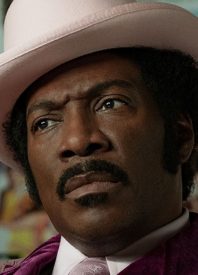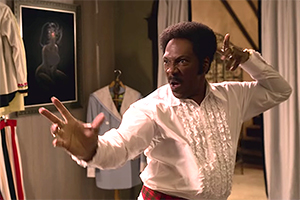
This movie is, thankfully, non-linear, but I’ll start talking about it that way anyway, or try to. Before Dolemite existed, he was Rudy Ray Moore (Eddie Murphy), a farmer’s son turned vaudeville performer at the Chitlin’ Circuit. He eventually stayed in LA as an emcee in a bar with black patrons. He also has a record store job to pay the bills. Part of doing the latter is waiving off ‘hobos’ (Claude Phillips) from entering the store. That’s until he realizes that borrowing that man’s stories was comedy gold. What Rudy sees in that man is a hard sell, especially with his friends. One of them, Jimmy Lynch (Mike Epps), called the man’s jokes ‘slave jokes’. Those slave jokes help Rudy into his next and most successful incarnation as a comedian and movie star.
But the word ‘slave’ sticks out. Maybe Jimmy used the word ‘slave’ as a throwaway insult to any part of the black community that he dislikes. But hearing that word reminded me of Wesley Morris’ episode in 1619. There, he argues that depictions of slavery were the first real piece of American culture. And just like most black entertainers, the culture forces Rudy to revert to that history. The movie, in the most tasteful way that it can, depicts Rudy’s reframing of those jokes as a personal reinvention.
The word ‘slave’ within that context also subverts an outsider’s understanding of the content of that history. Most ‘slave’ texts spoke of holiness and perseverance. On the other hand, the homeless man’s jokes, and therefore, his own rewriting of them, were blue jokes. In its own way, Dolemite Is My Name frames Rudy’s experience, and therefore, the black experience with some levity. People had both jokes and sex lives even while experiencing the worst of oppression. This movie says so much about history without making obvious declarations.
But what makes that argument valid here is how it balances levity and pathos. Dolemite is My Name tastefully reveals how Moore’s dark past influences him to persevere through comedy. He discovers that a struggling playwright, Jerry Jones (Keegan-Michael Key) also grew up in Arkansas. That revelation turns into them commiserating about that past. The film depicts that past through a photograph, through one of Rudy’s passionate monologues. There’s still a bondage to the land, to childhoods where abuse is prevalent. These are legacies and inheritances that Rudy and Jerry prefer to forget. They’re slivers instead of flashbacks, making the movie more coherent and present.
Murphy produced this film, but its director is Craig Brewer, who has made films about the black South. There will always be doubt when a white man directs such films. He’s also adapting a script that two white men, Scott Alexander and Larry Karaszewski, wrote. It doesn’t help that Brewer’s aesthetic after Footloose feels so clean that even the LA detritus feels sanitary. And yes, this is a biopic and audiences can Google Moore’s life before they watch this film. However, there’s no sense of danger here.
But what saves this is the casting of Murphy. During his worst years, he made homophobic jokes and mocked black stereotypes. The script shows the pervasiveness of homophobia in racialized communities, like when Rudy censors another friend Theordore Toney (Tituss Burgess). The film still shows Rudy and thus Murphy’s imperfections but trades stereotypes for full person with dignity. It specifically respects both Murphy now and Da’Vine Joy Randolph who plays Lady Reed. Both don’t fit conventional body standards, but their presence says so much about how real people like belong in film.
For more information on Dolemite Is My Name go to this page here. It hits the Netflix streaming service on Oct. 25th
- Release Date: 10/11/2019


